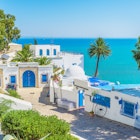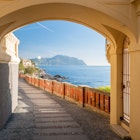

Sicily has a ton of personality and a few unique quirks – here's what you need to know © Jimena Roquero / Stocksy
Sicily is an island of mythic proportions, highly regarded for its natural beauty and the deep well of history it embodies in its ancient archaeological sites and luxe palazzos. A proud triangle, the island has three coastlines and two island chains and is home to the most active volcano in Europe, the indomitable Mount Etna.
In pursuit of claiming my Italian citizenship, I spent five summery months living in the Sicilian heartland, exploring the coast and ruins and immersing myself in the daily life of small-town Sicily. Preceded by its mafia history (both the fictional and the real), it is often misunderstood by visitors coming to the island with Godfather-inspired expectations, but there is a lot more to discover in Sicily beyond the stereotypes.
Here’s what you need to know before visiting.
1. Fly in and out of two different airports
The most efficient way to plan a tour through Sicily is to fly into Palermo and leave from Catania, or vice versa. Palermo and Catania are the island’s two largest cities and are located at opposite ends of the island. Each has its own airport with direct flights to the mainland and other European cities. There is also a small airport in Trapani, on the west coast – ideal if you want to visit the Egadi Islands – but here you’ll only find flights to and from mainland Italian airports.

2. Public transport in Sicily is not for the weak
Traveling by train through Sicily is convenient if you stick to the coasts and plan to travel out of main hubs like Palermo, Messina or Catania. However, the schedules are not always reliable, so you should plan plenty of buffer time into your itinerary if you choose to do Sicily without a car. Many of Sicily’s major destinations, like beachy San Vito Lo Capo and the historical hilltop town of Erice, are inaccessible by train, but you can get there by bus. Forgoing a car rental in Sicily is doable, but your trip will be much easier with a set of wheels.
3. Plan to move around
Sicily’s major attractions are dispersed throughout the island, so you will feel limited if you choose one city as your base for the whole trip. There are so many wonderful towns and islands, beautiful hotels, charming bed-and-breakfasts and a vast array of sights – from the ruins of Agrigento to the volcanoes of the Aeolian Islands, and all the historical villages and sunny vineyards in between.
4. Understand the real history of the mafia
Sure, you can buy plenty of Godfather merchandise when you get to Sicily, but you will have a deeper appreciation of the reality of the island’s mafia history if you take the time to understand it as a tragic story, not one to be idealized.
In Palermo, there is a free museum at the , which details the history of organized crime in Sicily and tells the story of Falcone and Borsellino, two heroic judges who were assassinated during the mafia wars of the 1990s. In Corleone – not actually where the movie was filmed – you can also visit CIDMA, a documentation and education center that dives deeper into the saga of the Maxi Trial, a three-year criminal trial that convicted over 300 people involved in organized crime.

5. Italy’s dining dogmas still apply, but one popular breakfast will surprise you
If this isn’t your first time in Italy, you probably already know where Italians stand when it comes to pineapple on pizza, cappuccinos after lunch and chicken in pasta – they will not hear of it. Sicily follows these same rules, but one tradition is likely to delight your inner child: ice cream for breakfast. Italian breakfasts are always sweet, but Sicilians take it to the next level by enjoying either gelato or granita, a type of shaved ice, sandwiched between a fluffy brioche bun first thing in the morning.
6. Sicily’s multicultural history makes it a unique destination
Separated from the mainland by the Strait of Messina, this region of southern Italy has its own cultural identity thanks to its long history of being conquered and influenced by rulers from all over the world. Each culture, from the Greeks and Romans to the Arabs and Crown of Aragon, left its mark in some way. These influences can be found in food – like Sicily's love of couscous – and urban planning and architecture. Whether you’re walking in a city with ancient Greek foundations like Ortigia or delighting in the Baroque streets of Noto, you’ll feel the difference in style but an overall ambiance that is still distinctly Sicilian.

7. You can drink the tap water
Like the rest of Italy, you’ll find many public fountains with free water that is safe to drink unless otherwise marked as “non-potable.” Unless you're advised otherwise, tap water in Sicily is good to drink, but you will find many locals prefer the taste of bottled water. Like elsewhere in Italy and Europe, if you ask for water at a restaurant, they will bring you a bottle and charge you for it. However, if you order an espresso at a cafe bar, it usually comes with a small cup of water on the side to cleanse your palette before you sip.
8. Sicily is the frontier of Europe’s migrant crisis
Ever the crossroads of the Mediterranean, Sicily is one of the main arrival points for refugees seeking asylum in Europe. This is a particularly large issue for the distant Italian island of Lampedusa, which is closer to the coast of Africa than it is to Sicily. The high number of arrivals has at times overwhelmed select areas of Sicily, but in my experience, the effect on the tourism industry has been minimal. Still, it’s wise to educate yourself about these current events before you arrive.
Explore related stories








 Local VoicesItaly vs Croatia: which Mediterranean country is right for you?
Local VoicesItaly vs Croatia: which Mediterranean country is right for you?Jun 13, 2024 • 8 min read
 Tips & Advice3 of this summer's best under-the-radar vacation spots in Italy
Tips & Advice3 of this summer's best under-the-radar vacation spots in ItalyMay 24, 2024 • 4 min read

